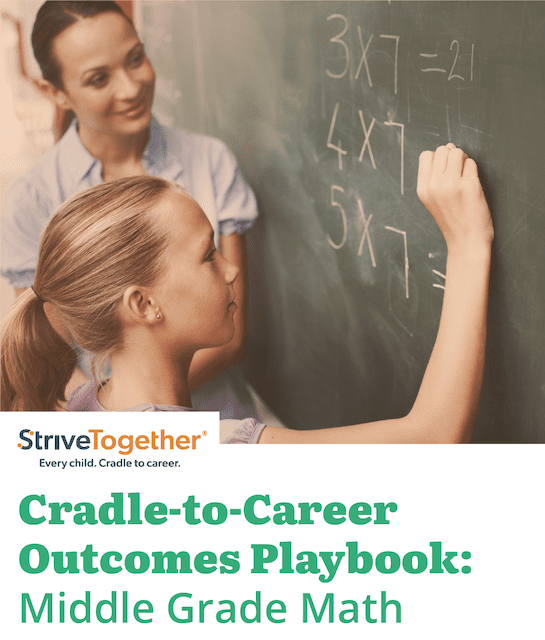OUTCOMES PLAYBOOK
Middle Grade
Math

Proficiency in middle grade math opens the door to a wide range of positive academic and life outcomes. Eighth grade math, in particular, is closely tied to future success, increasing students’ chances of enrolling in advanced coursework, accessing college and career opportunities, and building a foundation for lifelong learning and achievement.
The StriveTogether Outcomes Playbook: Middle Grade Math is a comprehensive guide to the latest research and best practices for this outcome, made possible by support from the Gates Foundation. Communities can use the playbook to identify local needs, prioritize areas for collective action and improve strategies.
Why Middle Grade Math Matters
Essential Skill Development
Middle school math builds critical thinking and problem-solving skills essential for future success.
Broader Career Trajectories
Research shows that math support and success is a key factor in future career trajectories, with students with a positive attitude about math being more likely to pursue careers in STEM fields (University of Kansas).
Increased Potential Earnings
According to the Center for Education Policy Research, recent declines in math proficiency represent a 1.6%, or $19,400, decrease in present value of lifetime earnings for the average K-12 student.
How to Use the Middle Grade Math Playbook
Mathematica’s Education-to-Workforce Framework is the inspiration behind the playbook’s organization and content. The playbook provides research-based guidance to help community leaders:
- Identify priorities
- Track key indicators to measure community-level progress
- Design strategies with stakeholders
- Build collective support for investments in middle grade math outcomes
How the Middle Grade Math Playbook Complements Mathematica’s Education-to-Workforce Framework
The playbook enhances the Education-to-Workforce Framework by integrating research on eighth grade math proficiency, Algebra I, advanced math access, student math mindsets, teacher development and more. It also expands practices and policies to improve accessibility for community-based organizations. 55 percent of the indicator categories included in this playbook (39 out of 71 total) come from the Education-to-Workforce Framework.

